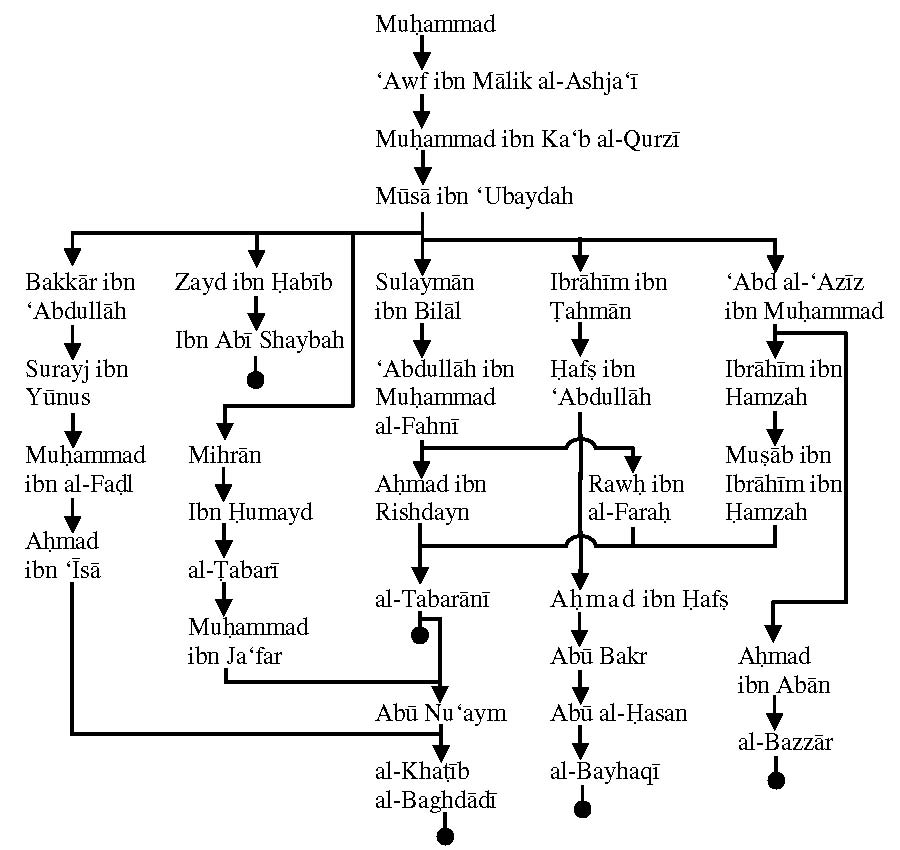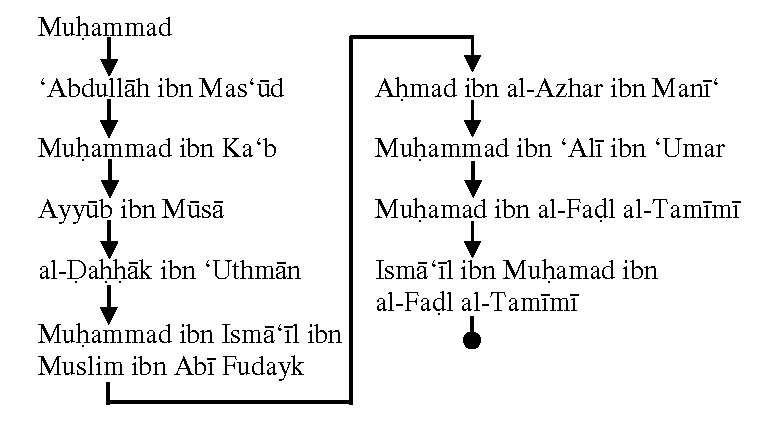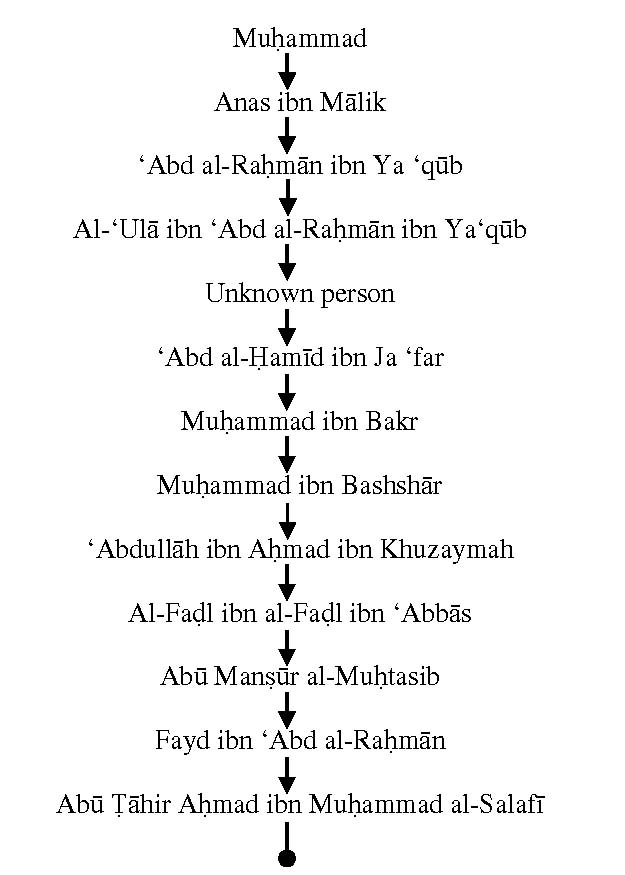i. ‘Awf ibn Malik (rta)
حدثنا زيد بن حباب عن موسي بن عبيدة قال
حدثنا محمد بن كعب عن عوف بن مالك الأشجعي قال قال رسول اللّٰه
صلي اللّٰه عليه وسلم من قرأ حرفا من كتاب اللّٰه كتب اللّٰه له
حسنة لا أقول الم ذلك الكتاب ولكن الحروف مقطعة عن الألف واللام
والميم
‘Awf ibn Malik
state that God’s Messenger said: “He who read one letter of
the Qur’an, God will right one g ood deed for him in his
account. I am not referring to words الم
ذلك الكتاب; in fact I am referring to each letter
separately like الألف واللام والميم.”
Following is the schematic illustration of the isnad of
this narrative’s variants:

This narrative cannot be reliably traced back to the
Prophet (sws). Following is the jarh recorded by al-Mizzi
about Musa ibn ‘Ubaydah (d. 152 AH): according to Ahmad ibn
Hanbal, he is munkar al-hadith and that his narratives have
not the slightest weight before him; Yahya ibn Ma‘in says la
yuhtajju bi hadithihi, da‘if and laysa bi shay’; ‘Ali ibn
Madini regards him to be da‘if al-hadith; Abu Zur‘ah says that
he is laysa bi qawi al-hadith; Abu Hatim regards him to be
munkar al-hadith; al-Tirmidhi and al-Nasa’i also regard him to
be da‘if; at another instance the latter says that he is laysa
bi thiqah; Ibn Sa‘d says that he is thiqah kathir al-hadith wa
laysa bi hujjah; Ya ‘qub ibn Shaybag says that he is da‘if al-hadith
jiddan and among whose narratives should not be adduced from
because of his weakness and weak memory; Ibn ‘Adi says that
most of his narratives are not secure from errors.
Ibn Hajar records: Abu Bakr al-Bazzar sys that his
proclivity towards worship had made him forgetful; al-Hakim
says that he is laysa bi al-qawi ‘indahum; al-Saji regards him
to be munkar al-hadith; Yahyan ib al-Qattan would not narrate
from him.
Ibn Hibban says that he is a pious person but has such a
bad memory that he narrates things which do not have any basis
and inadvertently reports from trustworthy narrators what is
not narrated by authorities and thus citing things from him is
prohibited.
Ibn al-Jawzi records that according to ‘Ali ibn al-Junayd
he is matruk al-hadith and al-Daraqutni regards him to be
da‘if.
Muslim regards him to be da‘if al-hadith.
Regarding Muhammad ibn Abi Fudayk (d. 200 AH), al-Dhahabi
records that though many regard him to be trustworthy,
according to Ibn Sa‘d, he is laysa bi hujjah.
ii. ‘Abdullah ibn Mas‘ud
(rta)
حدثنا والدي أنا محمد بن علي بن عمر نا أحمد
ابن الأزهر نا ابن أبي فديك عن الضحاك بن عثمان عن أيوب بن موسى
عن محمد بن كعب عن ابن مسعود - رضي الله عنه - أن رسول الله قال
من قرأ حرفاً من القرآن فله به حسنة والحسنة بعشر أمثالها لا
أقول ألم حرف ولكن ألف حرف ولام حرف وميم حرف
‘Abdullah ibn Mas ‘ud reported that
God’s Messenger (sws) said: “He who read one letter of the
Qur’an, there is a reward of one good deed and one good deed
is ten times multiplied. I do not regard to be one letter.
ألف and لام
and ميم are counted as
separate letters.”
Following is the schematic illustration of the isnad of
this narrative:

The narrative is broken between Muhammad ibn Ka‘b and
‘Abdullah ibn Mas‘ud (rta) died in 33 AH. Consider the
following information recorded by al-Mizzi:
According to Abu Ma‘shar, Abu Nuy‘aym, Abu Bakr ibn Abi
Shaybah, ‘Uthman ibn Abi Shaybah, al-Tirmishi and Qan‘ab ibn
Muharrar, Muhammad ibn Ka‘b died in 108 AH.
In the opinion of al-Waqidi, ‘Ali ibn ‘Abdullah al-Tamimi,
Khalifah ibn Khayyat, ‘Amr ibn ‘Ali and Ya‘qub ibn Shaybah he
died in 117 AH and al-Waqidi, ‘Ali ibn ‘Abdullah al-Tamimi and
Ya‘qub ibn Shaybah he was 87 when he died.
Ibn Hibban says that he died in 118 AH or 117 AH and was 80
years old.
According to Muhammad ibn ‘Abdullah ibn Numayr, he died in
117 AH.
Yahya ibn Ma‘in, ‘Ali ibn al-Madini and Ibn Sa‘d and others
says that he died in 120 AH. Abu ‘Umar al-Darir says that he
died in 129 AH but none corroborates this and must be a
mistake.
If he died in 108 AH and was either 80 or 87 years at his
death, then his years of birth are 28 AH or 35 AH.
If he died in 118/117 AH and was either 80 or 87 years at
his death, then his years of birth are 38/37 AH or 31/30 AH.
Now it is well known that ‘Abdullah ibn Mas‘ud died in
32-33 AH.
So whatever Muhammad ibn Ka‘b’s year of birth is, he could
not have heard from ‘Abdullah ibn Mas‘ud (rta).
Moreover:
About al-Dahhak ibn ‘Uthman (d. 153 AH), al-Mizzi records:
Yahya ibn Ma‘in and Ahmad ibn ‘Ali regard him to be
trustworthy; Abu Zur‘ah says that he is laysa bi qawi; Abu
Hatim says yuktabu hadithuhu wa la yuhtajju bihi.
No source says that Muhammad ibn ‘Ali ibn ‘Umar narrates
from Ahmad ibn al-Azhar ibn Mani‘.
In all probability, the narrative is broken here too.
Ibn Hibban says that Ahmad ibn al-Azhar ibn Mani‘ makes
errors.
About Muhammad ibn Isma‘il ibn Muslim ibn Abi Fudayk (d.
200 AH), Ibn Hibban says rubbama akhti.
iii. Anas ibn Malik (rta)
كتب
إلي فيد بن عبد الرحمن بن شاذي الهمذاني أنبا أبو منصور عبد الله
بن عيسى المحتسب أنبا الفضل بن الفضل بن العباس الكندي ثنا عبد
الله بن أحمد بن خزيمة الباوردي ثنا محمد بن بشار بندار ثنا محمد
بن بكر ثنا عبد الحميد بن جعفر أخبرني رجل عن العلاء بن عبد
الرحمن بن يعقوب عن أبيه عن أنس بن مالك أنه كان يحدث عن النبي
صلى الله عليه وسلم قال من قرأ حرفا من القرآن كتب الله له عشر
حسنات بالباء والتاء والثاء
Anas ibn Malik said reported that
God’s Messenger (sws) said: “He who read one letter of the
Qur’an, there is a reward of ten deeds for him for every
letter like الباء and
التاء and الثاء.”

There is an unknown person in this chain
of narration.
_________
|